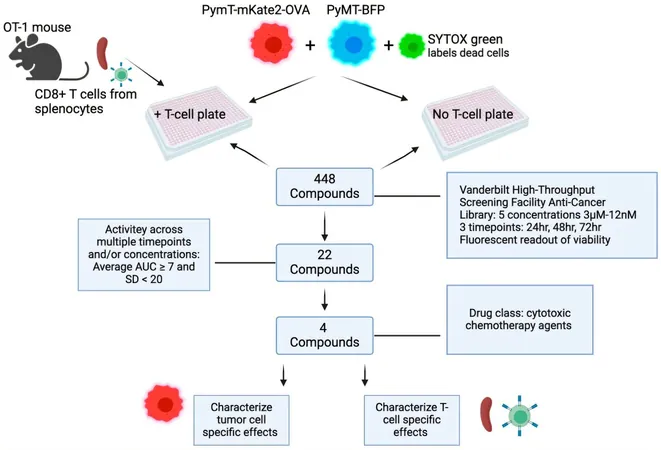
Groundbreaking Research Reveals Promising Drug Combinations to Supercharge Breast Cancer Treatment
2025-03-28
Author: Li
Groundbreaking Research Reveals Promising Drug Combinations to Supercharge Breast Cancer Treatment
In a significant leap forward in cancer therapy, researchers have identified potential drug combinations that could enhance treatment for triple-negative breast cancer (TNBC), an aggressive form of breast cancer that constitutes approximately 10% of all breast cancer cases diagnosed in the United States each year. One of the main challenges in treating TNBC stems from the exhaustion of CD8+ T cells—immune cells that typically play a crucial role in eliminating cancer cells.
To combat this issue, immune checkpoint inhibitors (ICIs) have emerged as a promising solution. These drugs work by blocking checkpoint proteins that lead to T-cell exhaustion, thus allowing these immune warriors to continue their battle against tumor cells. While some ICIs have received approval for use with standard chemotherapy in TNBC, patient responses are inconsistent and often short-lived. Alarmingly, many conventional chemotherapeutic agents have been shown to possess immunosuppressive effects, complicating treatment outcomes.
Research Focus: Enhancing Immune Response Against Cancer
The research addresses a critical challenge: conventional cancer therapies can inadvertently inhibit the capacity of immune cells, particularly CD8+ T-cells, to effectively kill tumor cells. The study aimed to identify existing drugs that could amplify the antitumor activity of these T-cells, thus improving patient outcomes. The exceptional team, including graduate student Kennady Bullock and collaborator Patricia Ward, examined a library of 448 anticancer compounds to determine their ability to enhance the cytotoxic effects of CD8+ T-cells on breast cancer cells.
Utilizing an innovative screening assay, the researchers cultured CD8+ T-cells specific to breast cancer antigens and assessed their tumor-killing potential in the presence of each compound. Importantly, the researchers also controlled for tumor death caused by the drugs alone to isolate the effects attributable to T-cell activity.
Key Findings: Uncovering Potent Compounds
The study yielded some exciting results: out of over 400 screened drugs, 22 were found to enhance the capacity of CD8+ T-cells to destroy breast cancer cells. The four most promising compounds—paclitaxel, bleomycin sulfate, ispinesib, and etoposide—were highlighted for their significant immunological effects. Interestingly, these drugs not only promoted T-cell activity but also increased the expression of key markers involved in immune responses, such as MHCI, MHCII, and PD-L1, alongside initiating immunogenic cell death.
According to Richmond, the creativity of Bullock, who devised the unique assay, played a crucial role in the project’s success, complemented by the technological capabilities of the High-Throughput Screening Facility.
Looking Ahead: Short-Term Goals and Future Research
The immediate aim of this research is to establish whether bleomycin sulfate, ispinesib, and etoposide can enhance patient responses to current ICI therapies, particularly given that paclitaxel is already utilized in breast cancer treatment. Notably, the researchers believe that employing these T-cell-enhancing drugs at lower doses could mitigate the common toxic side effects associated with higher doses typically required to induce direct tumor death.
This innovative approach could transform the chemotherapy experience for patients, making it less daunting and more manageable. The researchers aspire to leverage their findings to identify additional drugs that can amplify T-cell activity without introducing harmful side effects, thereby complementing the efficacy of immune checkpoint inhibitors.
Moving forward, Bullock plans to delve deeper into this area during her postdoctoral work with Dr. Patrick Hwu at the Moffitt Cancer Center, continuing the important quest to harness the immune system in the fight against cancer.
A Game-Changer for Cancer Treatment?
As the landscape of cancer therapy evolves, these findings may not only offer hope for those battling TNBC but could also pave the way for the development of less toxic and more effective treatment strategies across various cancer types. Keep your eyes peeled for future breakthroughs that could change the game for cancer patients everywhere!



 Brasil (PT)
Brasil (PT)
 Canada (EN)
Canada (EN)
 Chile (ES)
Chile (ES)
 Česko (CS)
Česko (CS)
 대한민국 (KO)
대한민국 (KO)
 España (ES)
España (ES)
 France (FR)
France (FR)
 Hong Kong (EN)
Hong Kong (EN)
 Italia (IT)
Italia (IT)
 日本 (JA)
日本 (JA)
 Magyarország (HU)
Magyarország (HU)
 Norge (NO)
Norge (NO)
 Polska (PL)
Polska (PL)
 Schweiz (DE)
Schweiz (DE)
 Singapore (EN)
Singapore (EN)
 Sverige (SV)
Sverige (SV)
 Suomi (FI)
Suomi (FI)
 Türkiye (TR)
Türkiye (TR)
 الإمارات العربية المتحدة (AR)
الإمارات العربية المتحدة (AR)